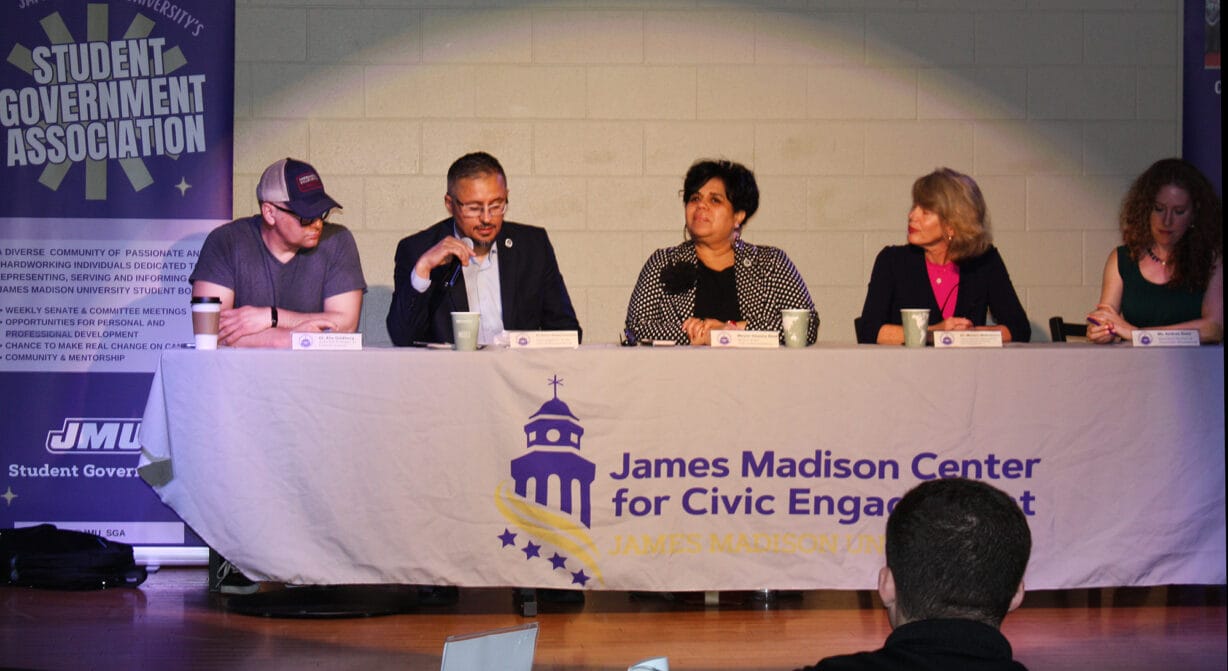
By Calvin Pynn, contributor
Strengthening the connections between JMU and Harrisonburg will require a little more listening and maybe a little less noise (especially late at night), according to panelists at a special town-gown forum Monday.
The 90-minute discussion, which kicked off JMU’s Civic Education Week, highlighted barriers — both perceived and logistical — between the campus and the rest of the community. Mayor Deanna Reed and city council member Nassar Alsaadun, for instance, suggested that city bus services overwhelmingly cater to the university’s schedule, sometimes to the detriment of other residents. At the same time, they acknowledged that the university’s more than 22,750 students and several thousand employees offer the city so much.
“When I say to you, there is no Harrisonburg without JMU and there is no JMU without Harrisonburg, that’s exactly correct,” Reed said. “So, we need each other, right? We need to be good neighbors to each other.”
Joining Reed and Alsaadun on the panel, held at JMU’s student union complex, were Andrea Dono, who is Harrisonburg Downtown Renaissance’s executive director, JMU political science professor Abe Goldberg and Monica McEnerny, the interim associate director for JMU’s Center for Civic Engagement.
The idea of being good neighbors was one of two challenges the mayor highlighted in the discussion — in particular, the noise and disruptive behavior from student parties in Harrisonburg’s residential neighborhoods. Reed alluded to multiple occasions when she has accompanied the Harrisonburg Police Department to shut down off-campus parties following noise complaints.
“So if you are someone who loves to have a good time from Thursday – or maybe Wednesday – through Sunday, you might see the mayor showing up at the Gingerbread House or other locations trying to shut parties down,” Reed said in a light-hearted jab. “But that is another area that we can improve on.”
Public transportation was the other major challenge that Reed highlighted in the relationship between JMU and Harrisonburg. The university shares the city’s buses, and Reed said their routes and hours primarily cater to JMU students, with transit services reduced during university breaks.
That has also created issues for community members working late shifts who lack their own transportation, and could benefit from more flexible transit hours
Improving public transit has been one of Alsaadun’s projects since starting his first term on city council earlier this year. So far, the most feasible option he said he’s found has been Valley Interfaith Action’s campaign for an on-demand bus service, although the Rockingham County Board of Supervisors rejected the initiative last fall, which has delayed any expansion of public transportation in the area.
Alsaadun said housing is still an ongoing concern between JMU and the city, as enrollment at the university grows each year.
“It’s a headache for the city council, and it is good for JMU, the increasing number of students, that will create a burden for housing,” Alsaadun said. “So, the city council is working hard to find alternative, affordable housing for people who work at JMU, Sentara [RMH] and other employers.”
The panel also touched on a perceived lack of communication between JMU and the Harrisonburg community. Andrea Dono pointed out that the university operates under different building codes and regulations in the city and cited the 2022 demolition of a historic house in the downtown area as an example of the community’s frustration.
“Sometimes it feels like there’s things that happen, that decisions are already made, and then the community finds out about it after the fact, and that’s not great engagement,” Dono said.
McEnerny agreed, acknowledging missed opportunities in the past to initiate partnerships.
“We’re doing some really wonderful things through the Madison Center and just across JMU, but I think we could be a lot better at letting you know what we’re doing,” McEnerny said.
Goldberg also said he’s noticed that some residents of Harrisonburg, including high school students, perceive JMU to be separate from the city — and inaccessible to them.
“We’ve got people in this community who don’t feel like this place is for them,” Goldberg said. “And that’s something that programming by itself isn’t necessarily going to address.”
Goldberg suggested that JMU could have an opportunity for better accessibility at events in the city, such as downtown festivals. He also said it’s important to listen to the community’s needs.
“When I want students to do work in the community, it’s not like the community members are just sitting there waiting on us with our capes to come in and solve all their problems,” Goldberg said. “We’re not the experts on their problems. They are the experts on their problems, and so really a lot of it involves listening.”
To listen first requires members of the campus and city communities to interact. To that end, Reed made an appeal to the students attending Monday’s forum to embrace a sense of belonging and responsibility while living in Harrisonburg and suggested getting involved with the city’s Parks and Recreation Department, substitute teaching, and applying for positions on the city’s boards, committees and commissions — for instance, the city’s elections board, or Harrisonburg’s Environmental Performance Standards Committee or the city’s Bicycle and Pedestrian Subcommittee.
“We need your voice at the table,” Reed said.
Thanks for reading The Citizen, which won the Virginia Press Association’s 2022 News Sweepstakes award as the top online news site in Virginia. We’re independent. We’re local. We pay our contributors, and the money you give goes directly to the reporting. No overhead. No printing costs. Just facts, stories and context. We value your support.













